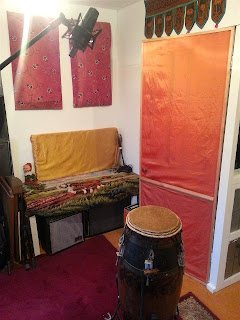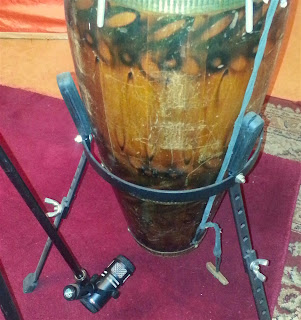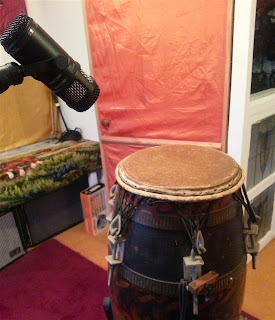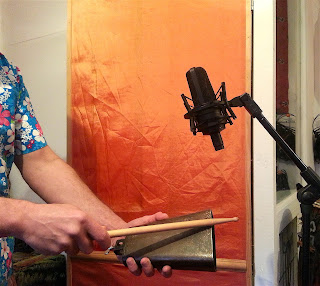Recording Drums, Percussion - & Dealing with People Who Like to Hit Things 6.
Here at The Coolest Recording Studio in London Town - we know it's All about Rhythm & Timing.
Unless they're Wild Alt Punks & it's meant to sound like it's all falling apart (good for insano energy) - you're gonna need a solid, tight rhythm section to lock down your floating elements (gtrs/vox/keys etc) - cause a lot of the time - you want your vocals & guitars slightly off time - it creates focus - & contra rhythms make things interesting.
Percussion can add huge amounts of positive energy to a recording, and not only in the high registers like tambourines or cowbells - congas / floor toms & mid range hand drums can all increase energy at differing frequencies.
How you mic them up can make a huge difference to the final feel of the session - so think about it first.
The High Road
 |
| Hi Mic Postition |
For an open, Airy sound that you can place in the back of a mix without it being too prominent - put a large diaphragm condenser mic like the
AT4033a approx 4-5 feet above the drum facing across the skin & slightly down. Position the player to the side of the mic so it doesn't pick up too much of their breathing.
At The Bottom
 |
| Bottom Conga Mic |
|
This is where you get your subs from - & boy I mean
subs (low frequencies) - you can use a
dynamic mic for low end & punchy low mids, or a condenser mic for low end clarity - this mic may be out of
phase with the high mic if you use them together - read about that
HERE. &
HERE.
Close Up
Where most of us first heard congas & hand percussion in popular music - was in the soul & especially funk records of the early 70's. These were generally close miked as they were usually recorded live in a room with other musicians - so to avoid
bleed or
spillage the mics had to be close to the sound source or instrument. To give them some natrual "distance" from the listener they were heavily
compressed (we'll go into compression later).
 |
| Close Mic Conga |
|
This is the most common way to mic up hand drums for popular music - though many pro studios will use a mix of all 3 to get the desired balance.
The Metal
For Tambourines / Cowbells - anything metallic - you need to place the instrument approx 12 - 16 inches below the diaphragm of a condenser microphone facing towards the player.
 |
| Cowbell Recording |
You want a bit of ambience to be recorded to stop the attack of the instrument being too harsh - the higher the mic - the sweeter & less defined the recorded sound - these are generaly supporting instruments so do not need to be too prominent in the mix.
 |
| Tambourine Recording |
|
Tuned Percussion
Glockenspiels - as with all metallic tuned percussion can be a nightmare to record - as usually the first thing you hear is the attack note (as the instrument is hit) - but it's the overtones that are generally the actual tuned note of the plate - so - Always use a good percussion player - someone who doesn't know what they're doing will make a mess - & always place either one (for mono work) or two ( for stereo work) condernser mics approx 4 feet above the instrument.
 |
| Tuned Percussion Recording |
Mic positioning will be dependant on the recording environment - for mono use try a mic at either end - but generally in the centre facing the player. For stereo you can put one mic ar each end facing the player - or the same but facing away from the player (i.e. over their shoulders) - or in an X/Y position in the middle of the instrument.
First thing you have to do though - is think about what these instruments are doing - & where they are going to be positioned in the mix!
Measure Thrice - cut once!
You can visit the studio Here.
 |
| Shrunken Goddamn Heads !!! |







Comments
Post a Comment